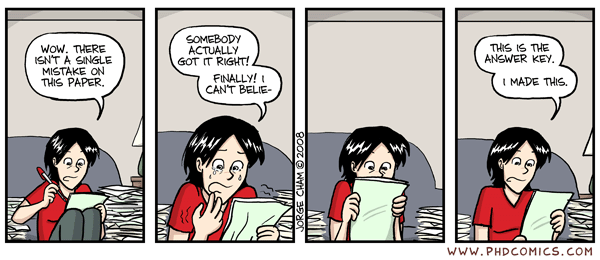Welcome to the end of term! I just finished marking a bucket-full of take-home exams with a short turnaround. It is stressful on your professors and marking TAs to churn grades out quickly – so I thought I’d offer some advice on how to make it easier on your marker. As a bonus, making it easier on your marker will help to strengthen your assignment. And trust me, you want to make your exams, essays, and papers as easy to mark as possible. The easier to mark, the happier your professor or TA will be. If you have a happy marker, you’re much more likely to get thorough feedback and a grade reflecting the marker’s good mood.
Some of this advice may seem simple, but it’s sometimes the things we forget about:
- Always run your assignment through spell-check. There is no excuse for not clicking that little button in your writing program. At Memorial, you also have a free Grammarly account (check your my.mun.ca account for how to register with Grammarly). If your assignment is riddled with simple grammatical, spelling, and punctuation errors… you are bound to lose marks.
- Make it very clear which question(s) you are answering, and answer them in order. For example, if you have the choice to answer 5 questions from a bank of 15, write in bold which questions you are answering. If you can (this is easier to do in a writing software than with pencil and paper), have the questions in sequential order. Ex, put the response to question 7 before your response to question 11. Bolding the question number helps a marker quickly find the question. If they have to hunt through your assignment to locate which question you’re answering, they will not be marking your assignment with the cheeriest mood.
- When writing papers, use descriptive subheadings (unless your professor tells you not to). Using bolded subheadings in a paper has the same effect as bolding the question number in assignments! It helps to organize your paper and quickly tell the marker exactly what they are about to mark. For example, if they are marking from a rubric, this tells the marker (and you!) exactly where marks are coming from or being deducted from. Again, it will make the marker’s job easier to grade the paper, and it will reflect well on you to have such a clearly organized paper.
- Use paragraphs. A single paragraph should never be longer than a page or even take up a full page when you’re in undergrad. If you are writing a 6-page paper and only have two paragraphs, your paper is going to be dense and difficult to read. Every time you begin discussing a new idea, you create a new paragraph. It is totally okay for a paragraph to be two sentences – give each idea its own paragraph. This will also emphasize when your paper is discussing a different idea, perspective, or example. It strengthens your writing while making the marker’s job easier.
- Answer every part of the question. This seems unnecessary, but I have read many midterm assignments and final papers which do not address every part of the question. Before submitting, it is worth an extra 5 minutes to double-check that you’ve answered every part of the question.
- When answering numerous questions on a midterm or take-home assignment, check how many points each question is worth. Make sure you provide enough information in your answer to earn those points. For a 10-point short answer question, ensure you have at least 10-points’ worth of information. This will also help you determine how much time you should give to each question: a question worth 10-points should get a more in-depth answer than a question worth 3-points. Prioritize the higher-priority questions accordingly, especially during a timed exam!
- For compare and contrast questions: ensure you define both terms/theories/etc, and then clearly explain how they are similar and how they are different. Often, students forget to either explain the terms initially, or forget to make a clear comparison. In theory, you would have 4 paragraphs: a description of term A, a description of term B, how the two are similar, and how the two are different.
- Show your critical thinking. Especially in short- or long-answer questions and essays, you need to show critical thinking to get high grades. Regurgitating information from class will earn you a decent mark, but it is critical thought that separates a 70% grade from a 90%. Show your professor/TA that you actually understand the concepts. Use original examples, not just the examples from class. Offer your own perspective! Link in themes that have popped up throughout the course. Reference outside material (especially for take-home assignments and papers, you’ll want to reference academic sources outside of the ones you read for class). If you can show the marker that you’ve really thought about the question, then your grades will certainly improve.
- When your assignment is returned with a grade, wait 48 hours before speaking with your professor or TA about the grade. I know the feeling when you get back a disappointing grade – it sucks especially when you think your work deserves better! However, there’s always a rationale behind the grade you receive. Take a breather, let your emotional reaction to the grade settle before going back over your assignment to see if the grade does suit it. Perhaps you missed part of the assignment requirements, or maybe there were glaring errors in your writing. After you take the time to sit on your grade, if you still think that you do deserve a higher grade, then you can approach your professor more calmly than right after receiving the grade. Take the 48-hour wait as a favour to yourself and a favour to your professor.
Cheers,
~Shannon
